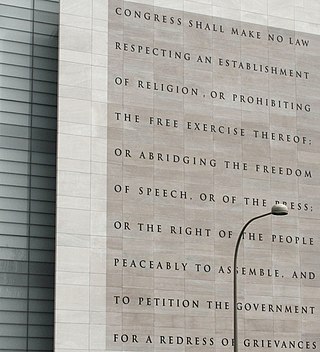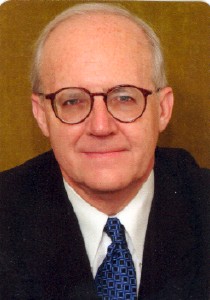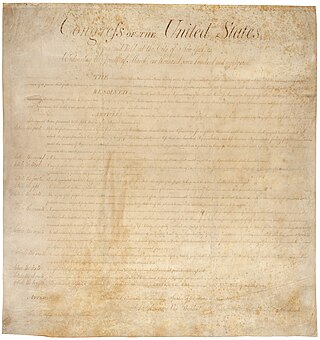
In the United States, freedom of speech and expression is strongly protected from government restrictions by the First Amendment to the U.S. Constitution, many state constitutions, and state and federal laws. Freedom of speech, also called free speech, means the free and public expression of opinions without censorship, interference and restraint by the government. The term "freedom of speech" embedded in the First Amendment encompasses the decision what to say as well as what not to say. The Supreme Court of the United States has recognized several categories of speech that are given lesser or no protection by the First Amendment and has recognized that governments may enact reasonable time, place, or manner restrictions on speech. The First Amendment's constitutional right of free speech, which is applicable to state and local governments under the incorporation doctrine, prevents only government restrictions on speech, not restrictions imposed by private individuals or businesses unless they are acting on behalf of the government. However, It can be restricted by time, place and manner in limited circumstances. Some laws may restrict the ability of private businesses and individuals from restricting the speech of others, such as employment laws that restrict employers' ability to prevent employees from disclosing their salary to coworkers or attempting to organize a labor union.
First National Bank of Boston v. Bellotti, 435 U.S. 765 (1978), is a U.S. constitutional law case which defined the free speech right of corporations for the first time. The United States Supreme Court held that corporations have a First Amendment right to make contributions to ballot initiative campaigns. The ruling came in response to a Massachusetts law that prohibited corporate donations in ballot initiatives unless the corporation's interests were directly involved.
Stanley v. Georgia, 394 U.S. 557 (1969), was a U.S. Supreme Court decision that helped to establish an implied "right to privacy" in U.S. law in the form of mere possession of obscene materials.

Danny Julian Boggs is an American attorney and a senior United States circuit judge of the United States Court of Appeals for the Sixth Circuit. He was appointed to the court in 1986 and served as its Chief judge from September 2003 to August 2009. Boggs was on the short list of President George W. Bush's candidates for the U.S. Supreme Court.
Virginia State Pharmacy Board v. Virginia Citizens Consumer Council, 425 U.S. 748 (1976), was a case in which the United States Supreme Court held that a state could not limit pharmacists’ right to provide information about prescription drug prices. This was an important case in determining the application of the First Amendment to commercial speech.
In law, commercial speech is speech or writing on behalf of a business with the intent of earning revenue or a profit. It is economic in nature and usually attempts to persuade consumers to purchase the business's product or service. The Supreme Court of the United States defines commercial speech as speech that "proposes a commercial transaction".
Bates v. State Bar of Arizona, 433 U.S. 350 (1977), was a United States Supreme Court case in which the Court upheld the right of lawyers to advertise their services. In holding that lawyer advertising was commercial speech entitled to protection under the First Amendment, the Court upset the tradition against advertising by lawyers, rejecting it as an antiquated rule of etiquette.
Florida Bar v. Went For It, Inc., 515 U.S. 618 (1995), was a United States Supreme Court case in which the Court upheld a state's restriction on lawyer advertising under the First Amendment's commercial speech doctrine. The Court's decision was the first time it did so since Bates v. State Bar of Arizona, 433 U.S. 350 (1977), lifted the traditional ban on lawyer advertising.
44 Liquormart, Inc. v. Rhode Island, 517 U.S. 484 (1996), was a United States Supreme Court case in which the Court held that a complete ban on the advertising of alcohol prices was unconstitutional under the First Amendment, and that the Twenty-first Amendment, empowering the states to regulate alcohol, did not lessen other constitutional restraints of state power.
Posadas de Puerto Rico Associates v. Tourism Co. of Puerto Rico, 478 U.S. 328 (1986), was a 1986 appeal to the Supreme Court of the United States to determine whether Puerto Rico's Games of Chance Act of 1948 is in legal compliance with the United States Constitution, specifically as regards freedom of speech, equal protection and due process. In a 5–4 decision, the Supreme Court held that the Puerto Rico government (law) could restrict advertisement for casino gambling from being targeted to residents, even if the activity itself was legal and advertisement to tourists was permitted. The U.S. Supreme Court affirmed the Puerto Rico Supreme Court conclusion, as construed by the Puerto Rico Superior Court, that the Act and regulations do not facially violate the First Amendment, nor did it violate the due process or Equal Protection Clauses of the Fourteenth Amendment.
Lorillard v. Reilly, 533 U.S. 525 (2001), was a 2001 case brought by Lorillard Tobacco Company when Massachusetts instituted a ban on tobacco ads and sales of tobacco within 1,000 feet of schools and playgrounds. Lorillard argued that this was an infringement on its First Amendment rights and that the regulation was more extensive than necessary. Applying the Central Hudson Test, the U.S. Supreme Court held that Massachusetts' ban on advertising and tobacco sales was overbroad. The Supreme Court also held that the Massachusetts regulation was preempted by federal law.
Board of Trustees of State University of New York v. Fox, 492 U.S. 469 (1989), is a United States Supreme Court case in which the Court instructed a lower court to reevaluate the compatibility of a resolution of the State University of New York that prohibited private commercial enterprises from operating in SUNY facilities with the First Amendment. The Court instructed the lower court to use the standard outlined in Central Hudson Gas & Electric Corp. v. Public Service Commission (1980) and determine whether the restriction on speech advanced the state's interest and, if so, whether the state's method was the least restrictive means to that end.
Carey v. Population Services International, 431 U.S. 678 (1977), was a landmark decision of the U.S. Supreme Court in which the Court held that it was unconstitutional to prohibit anyone other than a licensed pharmacist to distribute nonprescription contraceptives to persons 16 years of age or over, to prohibit the distribution of nonprescription contraceptives by any adult to minors under 16 years of age, and to prohibit anyone, including licensed pharmacists, to advertise or display contraceptives.

In the United States, some categories of speech are not protected by the First Amendment. According to the Supreme Court of the United States, the U.S. Constitution protects free speech while allowing limitations on certain categories of speech.
Matal v. Tam, 582 U.S. 218 (2017) is a Supreme Court of the United States case that affirmed unanimously the judgment of the United States Court of Appeals for the Federal Circuit that the provisions of the Lanham Act prohibiting registration of trademarks that may "disparage" persons, institutions, beliefs, or national symbols with the United States Patent and Trademark Office violated the First Amendment.
National Institute of Family and Life Advocates v. Becerra, 585 U.S. ___ (2018), was a case before the Supreme Court of the United States addressing the constitutionality of California's FACT Act, which mandated that crisis pregnancy centers provide certain disclosures about state services. The law required that licensed centers post visible notices that other options for pregnancy, including abortion, are available from state-sponsored clinics. It also mandated that unlicensed centers post notice of their unlicensed status. The centers, typically run by Christian non-profit groups, challenged the act on the basis that it violated their free speech. After prior reviews in lower courts, the case was brought to the Supreme Court, asking "Whether the disclosures required by the California Reproductive FACT Act violate the protections set forth in the free speech clause of the First Amendment, applicable to the states through the Fourteenth Amendment."
Zauderer v. Office of Disciplinary Counsel of Supreme Court of Ohio, 471 U.S. 626 (1985), was a United States Supreme Court case in which the Court held that states can require an advertiser to disclose certain information without violating the advertiser's First Amendment free speech protections as long as the disclosure requirements are reasonably related to the State's interest in preventing deception of consumers. The decision effected identified that some commercial speech may have weaker First Amendment free speech protections than non-commercial speech and that states can compel such commercial speech to protect their interests; future cases have relied on the "Zauderer standard" to determine the constitutionality of state laws that compel commercial speech as long as the information to be disclosed is "purely factual and uncontroversial".
Manhattan Community Access Corp. v. Halleck, No. 17-1702, 587 U.S. ___ (2019), was a United States Supreme Court case related to limitations on First Amendment-based free speech placed by private operators. The Court held that a public access station was not considered a state actor for purposes of evaluating free speech issues in a 5–4 ruling split along ideological lines. Prior to the Court's decision, analysts believed that the case had the potential to determine whether limitations on free speech on social media violate First Amendment rights. However, the Court's narrow holding avoided that issue.
Lehman v. City of Shaker Heights, 418 U.S. 298 (1974), was a case in which the United States Supreme Court upheld a city's ban on political advertising within its public transportation system. The Court ruled that ad space on public transit is not a "public forum", meaning that speech within this space receives lower First Amendment protections.



